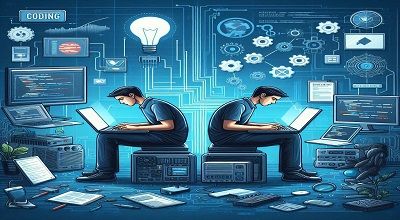Coding vs. Programming
“Coding vs. programming” is often used interchangeably, but they can have slightly different connotations depending on context. Here’s how they generally differ:
Coding:
- Focus: Coding typically refers to the process of writing specific instructions in a programming language to perform a particular task or achieve a specific outcome.
- Scope: It can encompass tasks such as writing individual lines of code, debugging, and testing code snippets.
- Level of Detail: Coding can involve granular tasks such as syntax correction, variable declaration, or implementing specific algorithms.
- Usage: It’s commonly used in contexts where the emphasis is on the act of writing code itself, often in smaller-scale projects or tasks.
Programming:
- Broader Scope: Programming tends to encompass a broader set of activities beyond just writing code. It includes tasks such as problem-solving, algorithm design, planning software architecture, and understanding the entire software development lifecycle.
- Strategic Thinking: Programming often involves higher-level thinking about how different components of a system will interact. How to optimize performance, and how to structure code for maintainability and scalability.
- Long-Term Perspective: Programming may involve considerations about the overall design of a software system. Its scalability, extensibility, and how it fits into the larger context of a project or organization.
- Usage: It’s commonly used in contexts where the focus is on designing and creating software solutions. As a whole, rather than just writing code snippets.
Summary
In summary, coding is a specific task within the broader scope of programming. Coding involves writing lines of code to implement specific functionalities. While programming involves a more holistic approach that includes problem-solving, planning, and designing software systems,
